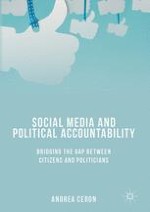
2017 | OriginalPaper | Buchkapitel
1. Social Media, Political Institutions and the Principal–Agent Dilemma
verfasst von : Andrea Ceron
Erschienen in: Social Media and Political Accountability
Aktivieren Sie unsere intelligente Suche, um passende Fachinhalte oder Patente zu finden.
Wählen Sie Textabschnitte aus um mit Künstlicher Intelligenz passenden Patente zu finden. powered by
Markieren Sie Textabschnitte, um KI-gestützt weitere passende Inhalte zu finden. powered by